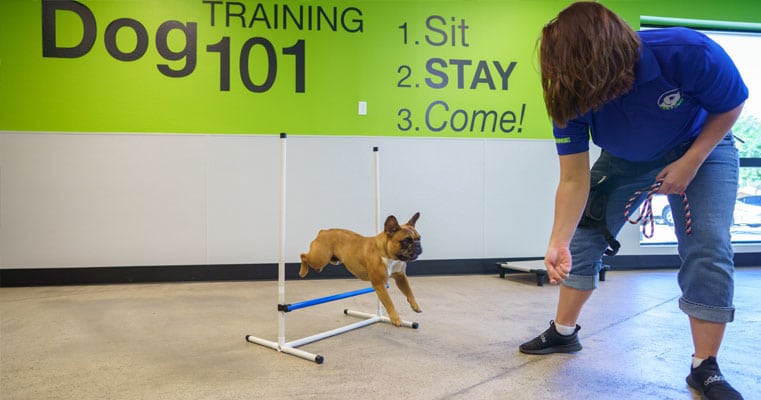Why Dog Training Near Me is Necessary for Your Canine Companion
Why Dog Training Near Me is Necessary for Your Canine Companion
Blog Article
Unlock Your Pet's Possible: Proven Pet Dog Training Strategies for Success
Efficient canine training is a nuanced procedure that rests on recognizing canine actions and utilizing scientifically backed strategies. Dog training. By including positive support, establishing clear commands, and prioritizing socialization, canine owners can cultivate a productive partnership with their pets. Obstacles often arise that call for customized services and a client technique. Exploring these proven techniques reveals not just the possibility for behavioral improvement yet additionally the much deeper bond that can be formed between owner and pet dog. What vital strategies must be thought about to genuinely open your pet's potential?
Comprehending Pet Habits
Recognizing pet dog habits is necessary for reliable training and fostering a favorable connection in between canines and their proprietors. A thorough understanding of canine body language, articulations, and social communications is critical for identifying their needs and emotions. Pet dogs connect primarily via non-verbal cues; for instance, a wagging tail might indicate exhilaration, while pinned ears can signify anxiety or entry.

In addition, ecological factors play a substantial function fit a dog's actions. Adjustments in routine, brand-new surroundings, or the visibility of unknown people can cause stress or anxiety in pet dogs. Identifying these triggers allows proprietors to alleviate damaging reactions and establish suitable training methods.
Eventually, a deep understanding of pet dog actions lays the structure for effective training methods, improving both actions and the general bond between the pet and its owner. dog training near me. This understanding is vital for promoting a well-adjusted, delighted canine buddy
Positive Reinforcement Techniques
Reliable training relies heavily on favorable reinforcement methods, which have been shown to yield substantial lead to shaping preferred habits in pet dogs. This method includes compensating a pet dog for displaying particular actions, thus enhancing the probability that these habits will certainly be repeated. Incentives can take numerous types, consisting of deals with, appreciation, playthings, or playtime, depending upon what inspires the specific pet.

It is important to slowly phase out benefits as the pet dog finds out the behavior, transitioning to intermittent support. This approach keeps the actions with time while preventing reliance on consistent rewards. By concentrating on favorable support, instructors can cultivate a trusting connection with their pets, advertising a cooperative and healthy training atmosphere that enhances general obedience and performance.
Developing Constant Commands
A basic aspect of successful canine training is the facility of consistent commands. Consistency in commands is critical for efficient communication in between the instructor and the dog. When commands are consistent, canines discover to link specific words with desired behaviors, which accelerates the training procedure and improves understanding.
To develop constant commands, it is necessary that all household members make use of the very same terms and motions. For instance, if one person utilizes "sit" while an additional says "take a seat," it can develop complication for the dog. Select clear, distinctive words for commands and make sure everyone associated with the canine's helpful resources training sticks to these options.
Strengthen commands through regular practice, ensuring that the pet receives adequate opportunities to respond correctly. When a pet dog successfully follows a command, instant positive support ought to comply with.
Lastly, hold your horses. Establishing regular commands takes some time and initiative. With commitment and clarity, you will certainly help your canine create a strong understanding of expectations, inevitably resulting in a mannerly friend.
Socializing and Direct Exposure
Interacting socially a canine is crucial for cultivating a certain and well-adjusted friend. This process entails revealing your pet to a range of atmospheres, individuals, and other pets to establish their social abilities and adaptability. Early socializing, preferably between the ages of three to fourteen weeks, is important, as it lays the groundwork for a pet dog's future actions.
Throughout socialization, aim to offer favorable experiences in different settings, such as parks, hectic roads, and homes with various other pets. Introduce your canine to various stimulations, consisting of sounds, views, and smells, making certain that each experience is rewarding. This direct exposure assists reduce fear and stress and anxiety, leading the means for a much more durable canine.
Participating in controlled group play sessions with various other pet dogs can also improve social skills, instructing your animal proper communications and dog latin dog training boundaries. Always monitor your pet's comfort degree during these experiences, gradually raising exposure as their confidence grows. Bear in mind, the objective is to create a well-shaped family pet that flourishes in diverse situations, advertising a harmonious relationship with both people and other pets. Prioritizing socializing will significantly add to your pet's general joy and behavior throughout their life.
Overcoming Common Educating Obstacles

Canines may struggle to concentrate in unfamiliar or busy settings. Gradually desensitize your canine to disturbances by beginning training in a silent atmosphere and gradually introducing even more stimulations as they become skilled.
Additionally, behavior concerns like jumping or too much barking can come to be aggravating. Address these by instructing different behaviors, such as resting steadly when greeting guests. Uniformity and perseverance are critical; reinforce preferred actions consistently and stay clear of scolding, which can bring about confusion.
Last but not least, recognize that each pet dog is one-of-a-kind, and training timelines might differ. Tailor your strategy to your pet's private demands, and look for professional assistance if needed. With determination and the ideal methods, getting over these difficulties can result in a well-trained, happy canine friend.
Conclusion
To conclude, opening a dog's prospective necessitates a comprehensive method that includes an understanding of canine habits, the application of favorable support strategies, and the establishment of constant commands. Early socialization and direct exposure to diverse environments additionally boost a pet dog's flexibility and confidence. By attending to typical training obstacles with tailored approaches and persistence, a participating and unified connection between pet dog and handler can be fostered, inevitably resulting in a mannerly companion capable of prospering in different situations.
Effective dog training is a nuanced process that pivots on understanding canine actions and employing clinically backed techniques.Recognizing dog behavior is necessary for efficient training and fostering a favorable relationship in between canines and their proprietors.Efficient training animal welfare courses online counts greatly on favorable reinforcement techniques, which have actually been shown to generate significant results in forming preferred behaviors in dogs. When commands are uniform, pet dogs find out to connect particular words with desired behaviors, which increases the training process and improves understanding.
In conclusion, opening a canine's prospective necessitates a comprehensive method that incorporates an understanding of canine habits, the application of positive support techniques, and the facility of regular commands.
Report this page